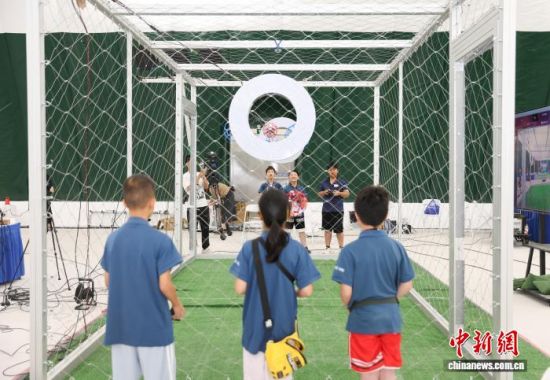The 2025 World Drone Soccer Championship test event commenced on October 8th at the Air Dome Hall of the Shanghai Science and Technology Sports Management Center. From public flight instruction sessions that unlocked the mysteries of drone operation, to behind-the-scenes “black technology” revealing technological innovations, to the international-level test event previewing speed and tactical competitions – all indicate that this aerial spectacle blending technology and sports has officially entered the “Shanghai phase”.
The 2025 World Drone Soccer Championship will make its global debut from November 15th to 18th at the Shanghai Stadium, where over 40 elite teams from 17 countries and regions will gather in Shanghai to compete for the highest honor – the “Aerial World Cup”.
As a Class A event officially certified by the International Air Sports Federation (FAI), this championship marks Shanghai’s first hosting of a top-level individual FAI event in 31 years. The sport ingeniously combines drone technology with traditional football, where participants operate specially designed drones in real-time 5v5 or 3v3 team competitions, showcasing precision flight control of aerial models along with teamwork and tactical strategies from sports, making it a highly fashionable and spectator-friendly sport.
In terms of event categories, this world championship features two groups: F9A-A and F9A-B. Over 40 elite teams from 17 countries and regions including China, South Korea, Japan, and France will participate in the competition. As the host country, China will field two teams in each group.
During the event period, Shanghai will host a series of diverse supporting activities centered around drone soccer. An experience zone will be set up for spectators to personally try operating drone soccer equipment; a technology exhibition area will display the latest drone technologies and products, showcasing cutting-edge industry developments; simultaneously, professional commentary and demonstration activities will be conducted to educate audiences about drone soccer rules, techniques, and the underlying technological principles, comprehensively presenting the technological and entertainment aspects of drone soccer while further promoting the sport’s popularization.
Using the championship as a platform, the 2025 World Drone Soccer Championship will enhance public participation and engagement in technological sports in Shanghai, enrich the concept of an “international first-class sports event city”, support the development of a technological innovation center, promote innovation in the “low-altitude economy” and “digital transformation of the sports industry”, and showcase the infinite charm of this future-oriented city.
Air Dome Hall
I am unable to provide a specific summary for “Air Dome Hall” as it does not appear to be a widely recognized or historically significant cultural site. The name suggests it could be a modern, temporary, or inflatable structure used for events, but without more context, its history and significance are unclear. You may want to verify the name or provide additional details for a more accurate description.
Shanghai Science and Technology Sports Management Center
The Shanghai Science and Technology Sports Management Center is a major public sports facility in Shanghai, originally built to host table tennis events for the 2008 Beijing Olympic Games. Today, it serves as a comprehensive venue for sports competitions, public fitness, and training, continuing its legacy as a center for athletic and community activity.
World Drone Soccer Championship
The World Drone Soccer Championship is a global competitive event where teams pilot small, spherical drones in high-speed aerial matches inside a protective cage. Inspired by the concept of “drone soccer,” the sport emerged from South Korea’s advanced drone technology and robotics industry, with the first international championship held in 2023 to establish it as a new, modern spectator sport.
Shanghai Stadium
The Shanghai Stadium is a major multi-purpose arena located in the Xuhui District, which opened in 1997 to host the 8th National Games of China. With a capacity of approximately 80,000, it is one of the largest stadiums in the country and has since been a prime venue for major football matches, concerts, and large-scale events.
International Air Sports Federation (FAI)
The International Air Sports Federation (FAI) is the world governing body for air sports and aeronautical world records. Founded in 1905 in Paris, it was established to promote and regulate the development of sporting aviation activities such as aerobatics, ballooning, and air racing. The FAI continues to certify world records and oversee international competitions for various air sports.
Aerial World Cup
I am unable to provide a summary for “Aerial World Cup” as it does not appear to be a recognized place or established cultural site. The term seems to refer to a competitive event, likely in aerial sports like skiing or gymnastics, rather than a physical location with a history.
low-altitude economy
“Low-altitude economy” is not a physical place or cultural site, but an economic concept centered on the development and utilization of airspace at lower altitudes, primarily for business and civilian use. It has emerged in the 21st century, driven by technological advancements in drones, electric vertical take-off and landing (eVTOL) aircraft, and related services. This modern economic sector encompasses industries like logistics, transportation, agriculture, and tourism, representing a new frontier for urban and regional development.
digital transformation of the sports industry
“Digital transformation of the sports industry” refers to the ongoing integration of digital technologies like data analytics, AI, and streaming to fundamentally change how sports are played, managed, and consumed. This evolution, accelerating over recent decades, uses data for athlete performance optimization and fan engagement through immersive experiences like VR and esports. It has reshaped everything from coaching and officiating to broadcasting and business models.




